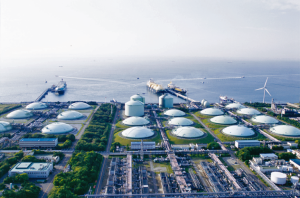
Tokyo — Japanese gas distributor Tokyo Gas Co Ltd is targeting a 67% rise in operating profit by 2030 through overseas expansion in areas like liquefied natural gas (LNG) and renewable energy projects, it said on Wednesday.
Tokyo Gas and other utilities are facing falling demand at home due to a fast-ageing society with a declining birthrate, while the liberalisation of the nation’s energy markets has increased competition among old-guard utilities.
Launching its new 10-year management vision on Wednesday, Japan’s biggest urban gas seller said it is targeting operating profit of 200 billion yen ($1.84 billion) in 2030, up from 120 billion yen forecast for the business year to March 2020.
Tokyo Gas, a major LNG buyer, is planning to invest aggressively overseas, raising its stake in LNG upstream, or production, projects, and developing LNG and gas infrastructure in Southeast Asia.
It also plans to boost renewable energy assets by more than 10 times from the current level.
“Our plan is to triple overseas profits by 2030 to account for about 25% of our total operating profit,” Tokyo Gas President Takashi Uchida told a news conference. Overseas profit makes up about 10% now, he said.
The company plans to raise its annual LNG transaction volume to 20 million tonnes by 2030 from 17 million tonnes currently, mainly by increasing trading activities to 5 million tonnes from nearly zero, Uchida said, to offset declining local demand.
“We are not talking about financial trading… it’s more to do with optimising our assets, including our stake in upstream LNG projects, LNG terminals and tankers,” he said.
All of the company’s trading activities will be based on its physical supplies, he added.
The long-term vision includes an ambitious target of achieving net-zero carbon emissions by around 2050, including customer emissions.
It aims to cut CO2 emissions by 27% by 2030 from 2013 levels by increasing its renewable energy capacity globally to 5 million kilowatts from 490,000 kilowatts now. It will also use alternative technologies such as CO2 capture, it said.
Kindly like us on facebook
- Reuters



